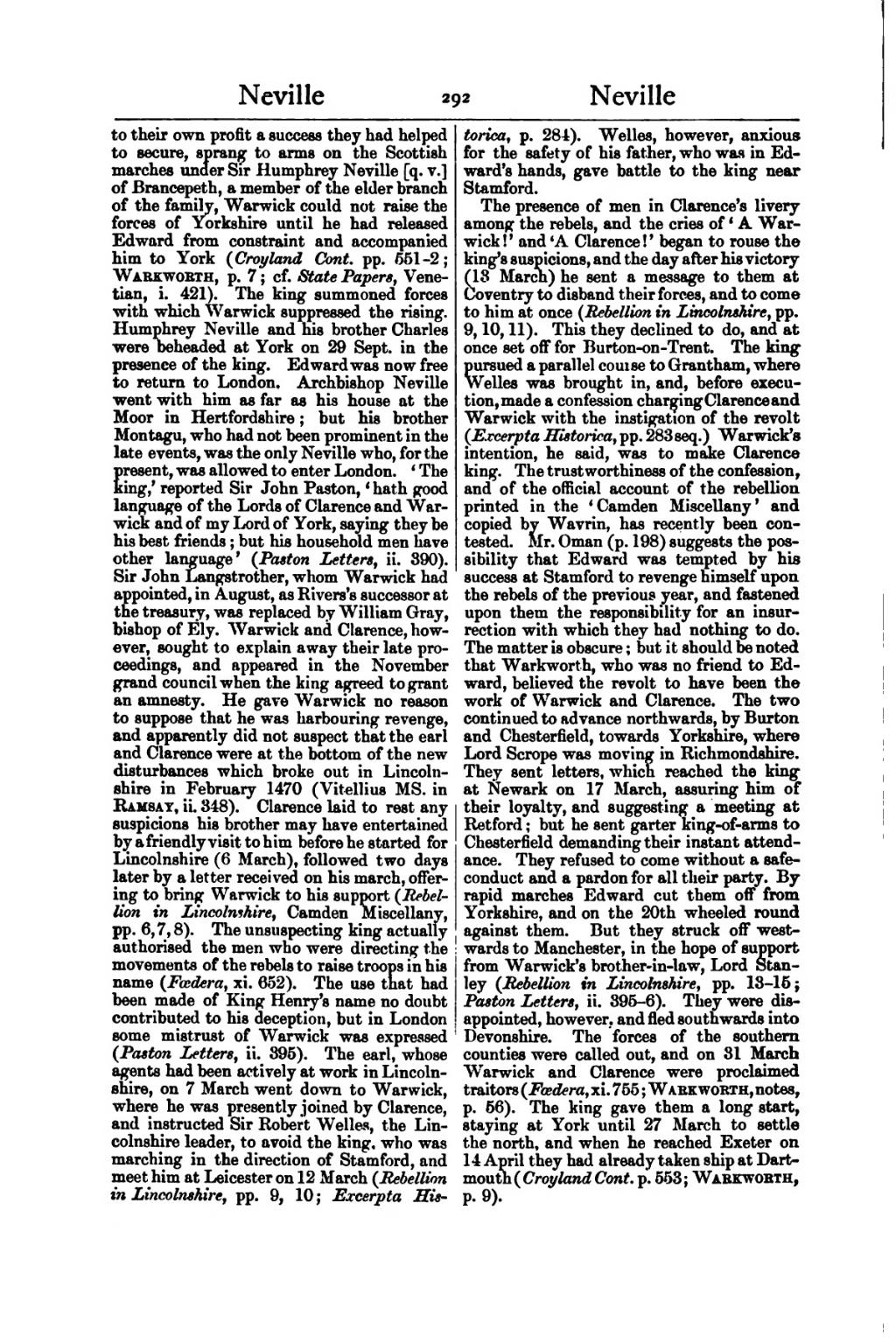to their own profit a success they had helped to secure, sprang to arms on the Scottish marches under Sir Humphrey Neville [q. v.] of Brancepeth, a member of the elder branch of the family, Warwick could not raise the forces of Yorkshire until he had released Edward from constraint and accompanied him to York (Croyland Cont. pp. 551–2; Warkworth, p. 7; cf. State Papers, Venetian, i. 421). The king summoned forces with which Warwick suppressed the rising. Humphrey Neville and his brother Charles were beheaded at York on 29 Sept. in the presence of the king. Edward was now free to return to London. Archbishop Neville went with him as far as his house at the Moor in Hertfordshire; but his brother Montagu, who had not been prominent in the late events, was the only Neville who, for the present, was allowed to enter London. ‘The king,’ reported Sir John Paston, ‘hath good language of the Lords of Clarence and Warwick and of my Lord of York, saying they be his best friends; but his household men have other language’ (Paston Letters, ii. 390). Sir John Langstrother, whom Warwick had appointed, in August, as Rivers's successor at the treasury, was replaced by William Gray, bishop of Ely. Warwick and Clarence, however, sought to explain away their late proceedings, and appeared in the November grand council when the king agreed to grant an amnesty. He gave Warwick no reason to suppose that he was harbouring revenge, and apparently did not suspect that the earl and Clarence were at the bottom of the new disturbances which broke out in Lincolnshire in February 1470 (Vitellius MS. in Ramsay, ii. 348). Clarence laid to rest any suspicions his brother may have entertained by a friendly visit to him before he started for Lincolnshire (6 March), followed two days later by a letter received on his march, offering to bring Warwick to his support (Rebellion in Lincolnshire, Camden Miscellany, pp. 6, 7, 8). The unsuspecting king actually authorised the men who were directing the movements of the rebels to raise troops in his name (Fœdera, xi. 652). The use that had been made of King Henry's name no doubt contributed to his deception, but in London some mistrust of Warwick was expressed (Paston Letters, ii. 395). The earl, whose agents had been actively at work in Lincolnshire, on 7 March went down to Warwick, where he was presently joined by Clarence, and instructed Sir Robert Welles, the Lincolnshire leader, to avoid the king, who was marching in the direction of Stamford, and meet him at Leicester on 12 March (Rebellion in Lincolnshire, pp. 9, 10; Excerpta Historica, p. 284). Welles, however, anxious for the safety of his father, who was in Edward's hands, gave battle to the king near Stamford.
The presence of men in Clarence's livery among the rebels, and the cries of ‘A Warwick!’ and ‘A Clarence!’ began to rouse the king's suspicions, and the day after his victory (13 March) he sent a message to them at Coventry to disband their forces, and to come to him at once (Rebellion in Lincolnshire, pp. 9, 10, 11). This they declined to do, and at once set off for Burton-on-Trent. The king pursued a parallel course to Grantham, where Welles was brought in, and, before execution, made a confession charging Clarence and Warwick with the instigation of the revolt (Excerpta Historica, pp. 283 seq.) Warwick's intention, he said, was to make Clarence king. The trustworthiness of the confession, and of the official account of the rebellion printed in the ‘Camden Miscellany’ and copied by Wavrin, has recently been contested. Mr. Oman (p. 198) suggests the possibility that Edward was tempted by his success at Stamford to revenge himself upon the rebels of the previous year, and fastened upon them the responsibility for an insurrection with which they had nothing to do. The matter is obscure; but it should be noted that Warkworth, who was no friend to Edward, believed the revolt to have been the work of Warwick and Clarence. The two continued to advance northwards, by Burton and Chesterfield, towards Yorkshire, where Lord Scrope was moving in Richmondshire. They sent letters, which reached the king at Newark on 17 March, assuring him of their loyalty, and suggesting a meeting at Retford; but he sent garter king-of-arms to Chesterfield demanding their instant attendance. They refused to come without a safe-conduct and a pardon for all their party. By rapid marches Edward cut them off from Yorkshire, and on the 20th wheeled round against them. But they struck off westwards to Manchester, in the hope of support from Warwick's brother-in-law, Lord Stanley (Rebellion in Lincolnshire, pp. 13–15; Paston Letters, ii. 395–6). They were disappointed, however, and fled southwards into Devonshire. The forces of the southern counties were called out, and on 31 March Warwick and Clarence were proclaimed traitors (Fœdera, xi. 755; Warkworth, notes, p. 56). The king gave them a long start, staying at York until 27 March to settle the north, and when he reached Exeter on 14 April they had already taken ship at Dartmouth (Croyland Cont. p. 553; Warkworth, p. 9).
